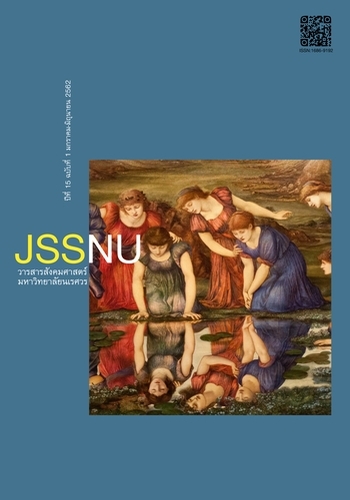The Production of Seeds for Export in the Borderlands of Thai-Lao PDR: Looking Through Perspectives of Land Ownerships and Land Use.
Main Article Content
Abstract
This paper is based on the research entitled “The change of land uses and land ownerships in the borderland of Thai-Laos conducted by Natedao Taotawin and Nopporn Choungching (2014). This research aims to answer three main questions: (1) what are the conditions which contribute to the expansion of cash crops in the borderland of Thai-Laos; (2) what are the mechanisms being used to support the expansion of cash crops in the borderland; and (3) what are the relationship between cash crops boom and its impact on changing patterns of land use and land ownerships in the borderland of Thai-Laos. The research major findings are: (1) the conditions that support the cash crops booms in the borderland of Thai-Laos are the governmental development of infrastructure, the availability of immigrant workers from Lao PDR, the suitable ecosystem, and the availability of lands which can be turned into agricultural lands; (2) the booms of cash crop in the borderland are more and more associated with agro-industrial. In case of hybrid seeds industry, the mechanism being used by transnational corporations (TNCs) is contract farming. Contract farming here is a mechanism to facilitate the growth of seed production in the borderland of Northeastern Thailand. Contract farming helps TNCs to access to lands and labors of farmers who have capabilities to produce hybrid seeds. In the perspective of TNCs, contract farming helps to ensure quality and quantity of hybrid seeds required. In the perspective of farmers, contract farming allows them to access to capital, knowledge and techniques, and new markets which are beneficial to them and helps them gaining better incomes and living standard; (3) impacts of cash crops booms on land uses and land ownerships in the borderland of Thai-Laos are enormous but different. In case of seeds production, the boom of seeds industry in the borderland does not lead to the rise of land markets and land speculations. As the growth of seeds production here results from intensification of land use for agriculture. Therefore, the farmers can maintain land ownerships and use lands for growing various kinds of crops.
Downloads
Article Details
References
of Agrarian Change: A Preliminary Analysis.” Journal of Agrarian Change, 12(1), 34-
59. Online Journal: https://r1.ufrrj.br/geac/portal/wp-content/uploads/2012/11/BORRASe-
FRANCO-Global-land-grabbing-and-trajectories-of-agrarian-change.pdf. Access on 1
December 2014.
Carney, Judith A. 1994. “Contracting a Food Staple in the Gambia,” pp.167-187. In Peter D.
Little and Michael J. Watts (eds.), Living under the Contract. Madison: University of
Wisconsin Press.
Delforge, Isabella. 2007. “Contract Farming in Thailand: A View from the Farm. The Occasional
Paper 2.” A Report for Focus on the Global South. Online Journal: file:///D:/Download/
Document11512200998.102053E-02.pdf. Access on 11 December 2014.
Donnan, Hastings. 2003. “Territoriality, Anthropology and the Interstitial: Subversion and
Support in European Borderland.” Focaal. 41(3). Online Journal: https://pure.qub.ac.uk/
portal/en/publications/territoriality-anthropology-and-the-interstitial-subversion-and-support-
in-european-borderlands(165e2c06-039e-4dd7-9577-c67a0afc4e12)/export.html.
Access on 10 December 2014.
Grover, David, and Ken Kusterner. 1990. Small Farmers, Big Business: Contract Farming and
Rural Development. Hampshire: MACMILLAN.
Harvey, David. 2007. A Brief History of Neoliberalism. New York: Oxford University Press.
Hirsch, Philip. 2009. “Revisiting Frontiers as Transnational Spaces in Thailand.” The Geo
graphical Journal. 175(2), 124-132. Online Journal: https://rgs-ibg.onlinelibrary.wiley.
com/doi/pdf/10.1111/j.1475-4959.2009.00321.x. Access on 18 December 2014.
Little, Peter D., and Michael J. Watts, eds. 1994. Living under Contract: Contract Farming and
Agrarian Transformation in Sub-Saharan Africa. Madison: University of Wisconsin Press.
Manarangsan, Sompop, and Suebskun Suwanjindar. 1992. “Contract Farming and Outgrower
Schemes in Thailand.” In Contract Farming in Southeast Asia: Three Countries Studies,
eds. David Glover and Lim Teck Ghee, 10-70. Kuala Lumpur: National University of
Malaysia.
Peluso, Nancy Lee, and Christian Lund. 2011. “New Frontiers of Land Control: Introduction.”
Journal of Peasant Studies. 38(4), 667-681. Online Journal: https://www.tandfonline.
com/doi/abs/10.1080/03066150.2011.607692. Access on 14 September 2014.
Rungmanee, Soimart. 2014. “Compromised Margin: Migration and Agrarian Transformation In
The Northeastern Thai – Lao Borderland.” Ph.D. Dissertation, School of Geosciences,
University of Sydney, Australia.
Taotawin, Natedao. 2011. “Politics of Organic Agriculture in the Context of Flexible Accumulation
and Agricultural Restructuring in Northeastern Thailand.” Ph.D. Dissertation,
Social Science, Chiang Mai University. Chiang Mai.
Walker, Andrew. 2012. Thailand’s Political Peasants: Power in the Modern Rural Economy.
Madison: University of Wisconsin press.
White, Ben. 1997. “Agro-industry and Contract Farmers in Upland West Java.” Journal of
Peasant Studies, 24(3): 100-136; from https://doi.org/10.1080/03066159708438644.
Access on 18 December 2014.
White, Ben, et al. 2013. The New Enclosures: Critical Perspectives on Corporate Land Deal.
London: Routledge.
Wilson, Thomas M., and Hasting Donnan, eds. 1998. Border Identity: Nation and State at
International Frontiers. Cambridge: Cambridge University Press.
World Bank, FAO, UNCTAD and IFDA, 2010. The Principles for Responsible Agricultural
Investment (PRAI). https://unctad.org/en/Pages/DIAE/G-20/PRAI.aspx.


